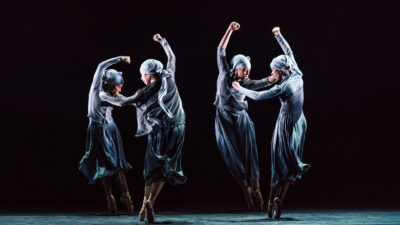
Il ritorno d'Ulisse in patria
A tale of unwavering love
Overview
To mark the 450th anniversary of Monteverdi’s birth, the Grange Festival’s artistic director Michael Chance, stage director Tim Supple, and designer Sumant Jayakrishnan, join forces to create a visually arresting production of Monteverdi’s Il ritorno d’Ulisse in patria.
The thrilling and deeply moving last episodes of Homer’s Odyssey form the story of Claudio Monteverdi’s last and most powerful opera. The weary but always wily Ulysses (Odysseus) is washed up on a rocky shore. It turns out to be his home island Ithaca. With the help of his guardian goddess, Minerva, his old shepherd, and his son, he plots and enacts the massacre of the hordes of greedy suitors besieging his wife Penelope and her court. Her constancy, determination and skill have helped fight them off for nearly twenty years. The final reconciliation of husband and wife are presented with heart-wringing majesty. This is musical drama writ immediate and visceral. An exotic sound world, memorable tunes, fast paced story-telling and dramatic intensity all worthy of Shakespeare make this opera truly great.
Previously shown in 2017. Discover the world-class opera, classical music, and dance performances in our 2025 festival lineup.
- Composer — Claudio Monteverdi
- Librettist — Giacomo Badoaro
Production Team
Synopsis
- Previous Slide
- Next Slide
- Setting
- Prologue
- Act I
- Act II
- Act III
~ Setting ~
Ithaca, an island in the Ionian Sea.
~ Prologue ~
Time, Fortune and Cupid taunt Human Frailty and warn of the power they possess.
~ Act I ~
Penelope is waiting. She is waiting for the return of her husband, Ulysses, who left twenty years ago to fight in the Trojan War and has still not returned. She curses her beloved husband for leaving her abandoned at home, plagued by vying suitors, while he goes to fight over a beautiful Greek woman across the sea. He has put her in an impossible situation. The grief and ache of his twenty years’ absence are becoming too much for her and she begs with all her might that he might come home.
Penelope’s maid, Melantho ponders over the game of love. Eurymachus is captivated by Melantho and flattering her reveals his feelings for her. The affection is mutual and they agree that knowing of their shared love and denying each other of that love would be a crime. They hope that Penelope will also give into the flattering and admiration of one of her many suitors soon.
Ulysses, fast asleep, is brought to shore by the Phaecians. Neptune is furious with the Phaecians for bringing Ulysses home safely, for Ulysses was responsible for blinding his son, the Cyclops Polyphemus. Jupiter persuades Neptune to give Ulysses a chance and to let him return home. Whilst Neptune agrees to this, he turns the Phaecians that helped him and their ship into stone, so that when Ulysses wakes he is alone and must fend for himself.
Ulysses wakes up not knowing where he is. He is hurt and angry to find himself abandoned by the Phaecians who had promised to bring him safely home to Ithaca. The Goddess Minerva appears disguised as a shepherd boy and informs Ulysses that he has in fact reached Ithaca. She then reveals her true identity to the relieved Ulysses and goes on to warn him that despite Penelope’s fidelity persistent suitors surround her. Minerva instructs Ulysses to adopt a disguise himself so as to catch the unsuspecting suitors when they next approach his wife. Minerva goes to find Ulysses’ son Telemachus, who will help him to reclaim his kingdom, whilst Ulysses waits with Eumaeus, an old, faithful servant who will also help him on the journey ahead.
Meanwhile, back at the Palace, Melantho pleads with Penelope to acknowledge that Ulysses must be dead and will never return. She begs her Queen to resist being an unhappy widow and to consider her future happiness, asking her to give in and to consider her living lovers, keen to marry, adore and support her.
In the countryside, Eumaeus is approached by Ulysses in his disguise as an old, beggar. He conveys the message to the delighted Eumaeus that his master, Ulysses will soon return.
~ Act II ~
Minerva brings Telemachus to the disguised Ulysses, and Eumaeus shares the news of Ulysses’ anticipated return. Eumaeus leaves to tell Penelope the news. Suddenly, a ray of fire strikes from the sky, and the earth beneath Ulysses’ feet opens up, engulfing him. Telemachus fears that this is a sign of the death of his father. But this vision of death is soon transformed into one of life, as Telemachus finds himself looking into the eyes of his father, his disguise abandoned. Ulysses explains that was the disguise was a scheme of Minerva’s to ensure his safety. He sends Telemachus to his mother and once again adopts his disguise so as to begin his own route to the kingdom under his beggar’s cloak.
Melantho describes Penelope’s heart as a diamond, for her love and commitment to Ulysses is so strong that no words coaxing her to love again can soften her resolve. The only response Penelope offers to the love being thrown at her is hate.
Three suitors, Antinous, Peisander and Amphinomous try to woo Penelope, but as ever they are refused. Eumaeus arrives and tells the Queen that her son is on his way to her, and that Ulysses is alive and will also be returning to her soon. Penelope is unconvinced, sceptical that her husband is actually alive after so many years away. The suitors fear Ulysses’ return as they know he will see them as enemies and that their lives will be threatened. They decide to take matters into their own hands and to murder Telemachus, but just as they are devising this plot an eagle flies overhead, which they take to be a message of disapproval from the Gods. They abandon this plan and focus on finding new tactics to lure Penelope into making a positive decision, quickly, about taking a new husband.
In the Forest, Minerva reassures Ulysses that she has a plan to help him seek revenge. She will ensure that an event is organised, bringing the suitors together, which will bring Ulysses victory and the suitors their death.
Telemachus tells his mother about Helen’s sublime beauty. He tells her Helen had a premonition that Ulysses would indeed return home to Ithaca and on his arrival would slay his mother’s suitors.
The suitors scold Eumaeus for inviting a filthy beggar into the palace but Eumaeus defends his decision telling them that the beggar has been led there by Fortune. Penelope rules that the beggar should remain. When the suitors begin their fervent declarations of love to Penelope she responds by setting a challenge, that whoever can string Ulysses’ bow with the greatest ease will win both her hand and the Kingdom. Each of the suitors’ attempts are futile; they cannot string the bow. The beggar steps forward and relinquishing any hope of a prize solely requests a chance to string the bow himself. At the amazement of the suitors, he effortlessly strings the bow and shoots each of the suitors, who die instantly.
~ Act III ~
Irus, the suitors’ parasitic servant, grieves for the suitors, for they were the only people in the world who looked out for him and fed him. Now, life feels hopeless to him and he fears that the only future ahead of him is death.
Penelope is in shock that the beggar she let into her palace caused the immediate deaths of the suitors. Eumaeus goes to her and informs her that the beggar was in fact Ulysses, and that her husband has returned to her. She is repelled by Eumaeus, convinced that he is lying to her. Her son, Telemachus, joins with Eumaeus, urging his mother to believe that Ulysses has returned.
Minerva appeals to Juno asking that Ulysses be allowed to live his life in peace, rightfully restored to his Kingdom, throne and wife. Jupiter speaks to Neptune and persuades him to end his pursuit of Ulysses too. Mercy is granted to Ulysses.
At the Palace, the nurse Eurycleia is torn as to whether be silent or to speak up, for she has noticed a scar on the back of the beggar which reveals his true identity to be the long, lost Ulysses. Then, Ulysses appears in his true form before Penelope who keeps her distance, scared that this is a cruel trick and that she is being deceived. Eurycleia and Eumaeus both try to convince Penelope but she remains untrusting. However, when Ulysses speaks of their bed always covered with a silk throw made by Penelope’s own hands she realises that no other person could possibly know something so intimate and so personal. She rushes to the man standing before her, elated that after so many years her husband, her only love, had finally come home.
Cast
Reviews
Anna Bonitatibus hit the emotional bull's eye
Meticulously directed by Tim Supple and inventively designed by Sumant Jayakrishnan
A bold and innovative launch to the new Grange Festival
Nilon wonderfully captures Ulisse's noble anguish
Paul Nilon turns in an extraordinary Ulisse

Stay connected
Join The Grange Festival community and stay connected to a world of enchanting performances and exclusive events.



